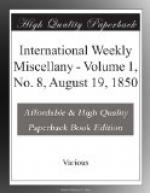While erecting jurymasts on board the Frolic, soon after, a suspicious sail was seen to windward, upon which Captain Jones directed Lieutenant Biddle to shape her course for Charleston, or any other port of the United States, while the Wasp should continue upon her cruise. The sail coming down rapidly, both vessels prepared for action, but it was soon discovered, to the mortification of the victors in this well-fought action, that the new enemy was a seventy-four, which proved to be the Poictiers, commanded by Admiral Beresford. Firing a shot over the Frolic, she passed her, and soon overhauled the Wasp, which, in her crippled state, was unable to escape. Both vessels were thus captured, and carried into Bermuda. After a few weeks, a cartel was proposed by which the officers and crew of the Wasp were conveyed to New York. On the return of Captain Jones to the United States, he was everywhere received with demonstrations of respect for the skill and gallantry displayed in his combat with the enemy. The legislature of Delaware gave him a vote of thanks, and a piece of plate. On the motion of James A. Bayard, of Delaware, Congress appropriated twenty-five thousand dollars, as a compensation to the commander, his officers, and crew, for the loss they had sustained by the recapture of the Frolic. They also voted a gold medal to the Captain, and a silver medal to each of his commissioned officers. As a farther evidence of the confidence of government, Captain Jones was ordered to the command of the frigate Macedonian, recently captured from the British by Decatur. She was rapidly fitted out under his direction, in the harbor of New York, and proposed for one of Decatur’s squadron, which was about to sail on another expedition. In May 1811, the squadron attempted to put to sea, but, in sailing up Long Island Sound, encountered a large British force, which compelled the United States vessels to retreat into New London. In this situation the enemy continued an uninterrupted blockade during the war. Finding it impossible to avoid the vigilance of Sir Thomas Hardy, who commanded the blockading fleet, the government ordered Captain Jones to proceed with his officers and crew to Sackett’s Harbor, and report to Commodore Chauncey, as commander of the frigate Mohawk, on lake Ontario. There the Americans maintained an ascendency, and continued to cruise until October, when the British squadron, under Sir James Yeo, left Kingston, with a greatly superior force, which caused the United States squadron to return to Sackett’s Harbor. It seemed, indeed, that the contest now depended on the exertions of the ship carpenters. Two line of battle ships were placed on the stocks, and were advancing rapidly to completion, when, in February 1815, the news of peace arrived, with orders to suspend further operations on these vessels. A few weeks after the peace was announced, Captain Jones with his officers and crew was ordered to repair to the seaboard, and again




